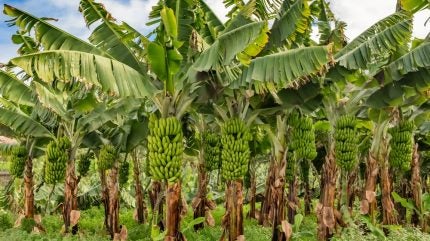
The head of fruit and vegetable major Fresh Del Monte has warned of a global banana shortage linked to diseases and climate change.
Chairman and CEO Mohammad Abu-Ghazaleh said yesterday (30 July) he had been predicting such an “industry-wide” calamity for “years” as he discussed second-quarter results with analysts. The “causes are clear”, he added.

Discover B2B Marketing That Performs
Combine business intelligence and editorial excellence to reach engaged professionals across 36 leading media platforms.
Abu-Ghazaleh suggested the problems are related to fungal diseases, namely Black Sigatoka and Fusarium, which is otherwise known as Tropical Race 4.
The fungus Pseudocercospora fijiensis causes Black Sigatoka, or the so-called Black Leaf Streak Disease (BLSD) on bananas and plantains, according to the British Society for Plant Pathology.
Fusarium, meanwhile, is a soil-borne pathogen that attacks the roots of the banana causing the Banana Fusarium Wilt disease by clogging its vascular system, according to the Food and Agriculture Organization (FAO) of the United Nations.
“Shifting climate patterns, particularly warmer temperatures combined with humidity, are accelerating the spread of disease in key growing regions, primarily Black Sigatoka,” Abu-Ghazaleh explained. “On top of that, a continued spread of Fusarium, well known as Tropical Race 4, is adding further pressure.”

US Tariffs are shifting - will you react or anticipate?
Don’t let policy changes catch you off guard. Stay proactive with real-time data and expert analysis.
By GlobalDataHe added: “These diseases are having a direct impact on supply. Black Sigatoka is affecting crops across Central America, while other countries are facing the compounded impact of both diseases.”
There were some positives expressed by the Fresh Del Monte chief, however, around efforts being made to deal with the diseases.
“As we have shared previously, our R&D teams have been working to address the global threat posed by Fusarium Wilt and we are pleased to report that field testing of TR4-resistant gene-edited banana lines is expected to begin in the coming months, a meaningful step toward long-term category resilience.”
The FAO says on its website: “TR4 is recognised as one of the most aggressive and destructive fungi in the history of agriculture and the world’s greatest threat to banana production.
“The continued spread of TR4 would be devastating for the communities who rely on bananas for their livelihoods, but also sad for those who simply enjoy eating them. Bananas and plantains are critical to food security and livelihoods of around 400 million people.”
Fresh Del Monte’s Abu-Ghazaleh shares some of those thoughts, as he said “global demand for bananas remains strong as they continue to be one of the most affordable and accessible fruits in the grocery aisle”.
In other fruit areas, Abu-Ghazaleh said the Florida-headquartered business had struck a new milestone with a market entry to the Middle East for pineapple under Fresh Del Monte’s Pink Glow brand in the UAE.
“While still early in scale, it reflects a strategic step in expanding our high-value portfolio into new international markets, where brand distinction and long-term potential align,” Abu-Ghazaleh said to mark the development.
The group reported net sales for the six months to 27 June of $2.28bn, a 1.3% increase from the corresponding period in 2024. For the full year, sales are expected to rise 2%.
Within those numbers, fresh and value-added products grew 2.9% to $1.41bn, while global banana sales were essentially flat at $773.7m.
Fresh Del Monte’s first-half operating profit climbed 0.9% to $113.2m. Net income was up 12.5% at $89.3m.
Meanwhile, the CEO was asked on a results follow-up call with analysts yesterday to provide some insight on the impact of Black Sigatoka on the banana crop in Costa Rica.
“Costa Rica alone is down over 20% in their export volume this year as we speak. And that’s mainly because of the Sigatoka disease as well as other issues in the soil and the climate,” Abu-Ghazaleh responded.
“I don’t see that this is going away. This is getting worse as a matter of fact.”





